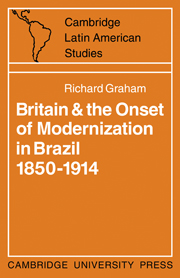Book contents
- Frontmatter
- Contents
- Preface
- Abbreviations used in the footnotes
- A note on spelling
- Brazil: physical features and state capitals
- Introduction: Contrasting Societies: Britain and Brazil
- 1 The Onset of Modernization in Brazil
- 2 Coffee and Rails
- 3 The Export–Import Complex
- 4 The Urban Style
- 5 Britain and the Industrialization of Brazil
- 6 Changing Patterns of Labor: Slave Trade and Slavery
- 7 Britain and the Entrepreneurs
- 8 Freedom and Association
- 9 Progress and Spencer
- 10 Middle-Class Britain and the Brazilian Liberals
- 11 Individual Salvation
- 12 Declining Influence
- Conclusion
- Appendix A Financial Record of the Minas and Rio Railway Company, Ltd, 1881–1902
- Appendix B Financial Record of the São Paulo Railway Company, Ltd, 1865–1920
- Appendix C Exports from Great Britain to Brazil, 1850–1909
- List of Sources
- Index
- Frontmatter
- Contents
- Preface
- Abbreviations used in the footnotes
- A note on spelling
- Brazil: physical features and state capitals
- Introduction: Contrasting Societies: Britain and Brazil
- 1 The Onset of Modernization in Brazil
- 2 Coffee and Rails
- 3 The Export–Import Complex
- 4 The Urban Style
- 5 Britain and the Industrialization of Brazil
- 6 Changing Patterns of Labor: Slave Trade and Slavery
- 7 Britain and the Entrepreneurs
- 8 Freedom and Association
- 9 Progress and Spencer
- 10 Middle-Class Britain and the Brazilian Liberals
- 11 Individual Salvation
- 12 Declining Influence
- Conclusion
- Appendix A Financial Record of the Minas and Rio Railway Company, Ltd, 1881–1902
- Appendix B Financial Record of the São Paulo Railway Company, Ltd, 1865–1920
- Appendix C Exports from Great Britain to Brazil, 1850–1909
- List of Sources
- Index
Summary
Coffee exports provided the fuel for the steadily accelerating thrust of economic and social change in Brazil during the latter half of the nineteenth century. And the increase of coffee production to meet world demand, that is, the cultivation of coffee on lands ever further from the coast, was made possible by the railways. As already noted, coffee and rails spread together and were partners in the conquest of a new frontier, an economic frontier, from which were to spring the pioneers not only of coffee but of industry. Therefore, the role of the British in fostering the railway system which served the coffee region is central to this study.
Brazilians early caught the fever for stretching rails of steel across the land, and the carrier of the infection was the British engineer and promoter. A Britisher even inspired Brazil's basic railroad law. Thomas Cochrane—a second cousin of the Admiral Cochrane who gained fame in the wars of Latin American independence—prepared a glowing prospectus as early as 1839 for a railroad which, he said, by linking São Paulo and Rio de Janeiro would do for Brazil what the Stockton and Darlington had done for Britain. Although the project had to be abandoned after he had managed to organize a company to build it, his efforts were not without fruit. His experiences and the pressure he exerted led at last to the acceptance of the idea that railroads would not be built in Brazil without government aid: he urged the government to guarantee interest of 5 per cent on approved railroad projects, and after much debate the government finally accepted this suggestion. It became law in 1852.
- Type
- Chapter
- Information
- Publisher: Cambridge University PressPrint publication year: 1968
Accessibility information
- 1
- Cited by

